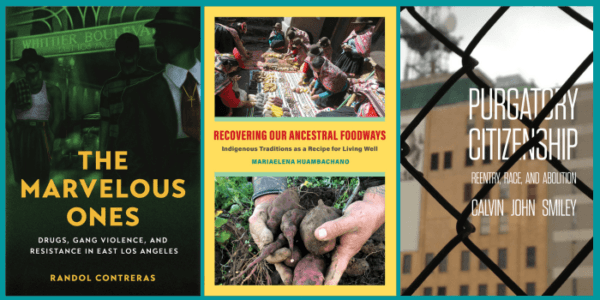"Calvin John Smiley simultaneously exposes the cruelty and injustice of the reentry system and the human struggles for redemption and stability of those caught up in it. In the end, we hear those voices demanding nothing less than a world beyond prisons."—Alex Vitale, author of The End of Policing
"Smiley's new book Purgatory Citizenship is a much-needed exploration of postincarceration reentry from the point of view of the people experiencing it firsthand, offering important insights into this often ignored and misunderstood part of our carceral system. This is an important addition to the growing canon of works trying to understand and dismantle the prison industrial complex."—Hugh Ryan, author of The Women's House of Detention: A Queer History of a Forgotten Prison
"Purgatory Citizenship powerfully juxtaposes the humanity of people navigating reentry with the inhumanity of the varying parts of the criminal legal system (e.g., police, courts, halfway houses). The narratives of individuals 'doing' reentry poignantly describe their lives prior to, during, and after incarceration, while placing them squarely in historical, legal, political, and psychological contexts and legacies. The multiple, overlapping, and often insurmountable quagmires Smiley documents explain to any reader why reentry is so difficult. Smiley closes with a detailed description of what abolition requires and would mean. This is ethnography at its best, addressing the harrowing, complicated, significant, and timely problem of reentry with stunningly beautiful writing."—Joanne Belknap, author of The Invisible Woman: Gender, Crime, and Justice
"Smiley's unusual combination of evidence-based research, real-world experience, and heart creates a perfect manual for everything that is wrong with the way we punish people in America. This book grabs the reader by the collar and forces them to see the reentry process for what it really is: not a means of rehabilitation, but an excuse for further state violence. At the same time, Smiley convinces us that while systemic transformation won't come easy, it is within our reach."—Dan Canon, author of Pleading Out: How Plea Bargaining Creates a Permanent Criminal Class
"Smiley has brought forth a powerful treatise that displays the far-reaching impact the New Jim Crow has on Black Americans. He exposes the absurdity of the reentry industrial complex and its apparent marriage to state-sponsored racialized violence. Utilizing the powerful narratives of Black Americans navigating this impossible obstacle course, he appropriately underscores the necessity of abolitionist frameworks for true liberation and justice."—Jason M. Williams, coeditor of
Survivor Criminology: A Radical Act of Hope "Smiley's book is a critical analysis and unique contribution to the reentry literature about diminished rights. By weaving together the voices of those most harmed by the criminal justice system and the story of how progressive reforms have fallen short, Smiley shows how individuals living in purgatory are citizens without rights, which supports his argument that abolition is the next logical step."—Keesha M. Middlemass, author of
Convicted and Condemned: The Politics and Policies of Prisoner Reentry "This is ethnography at its finest. Smiley offers a critical, abolitionist perspective on reentry that is birthed in and through his revealing interviews with formerly incarcerated men and women as they navigate a system they know is designed to entrap them."—Jill McCorkel, author of
Breaking Women: Gender, Race, and the New Politics of Imprisonment

